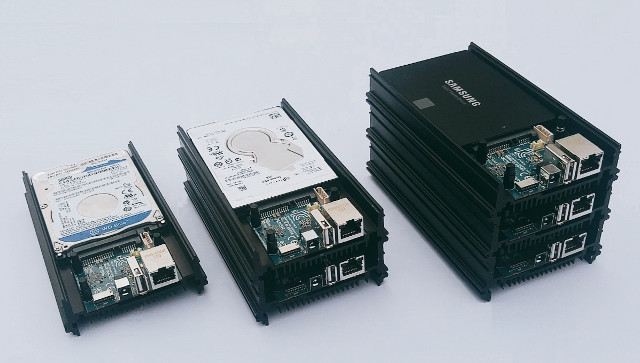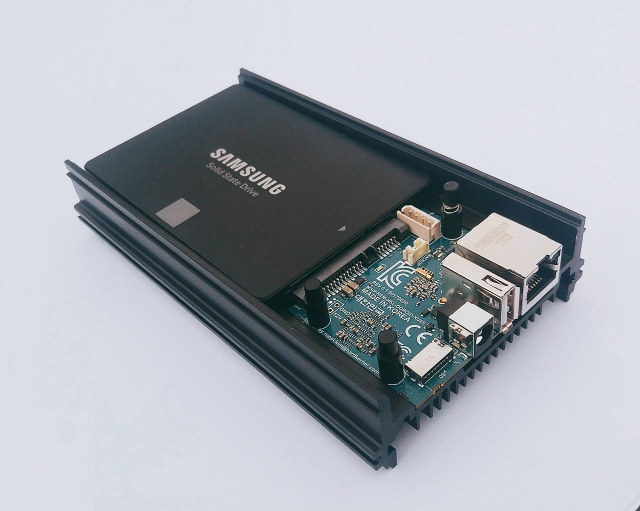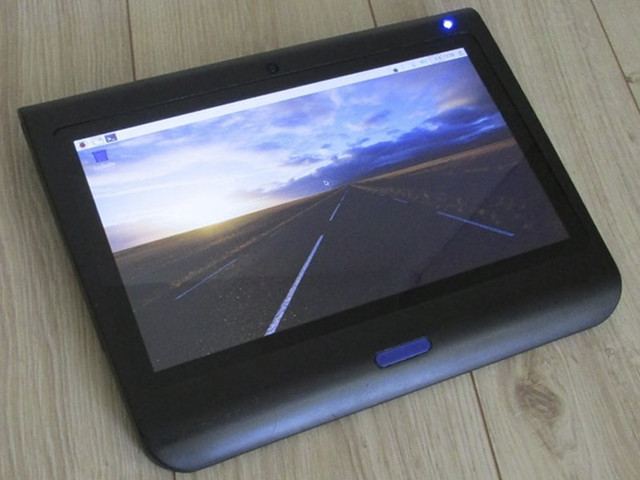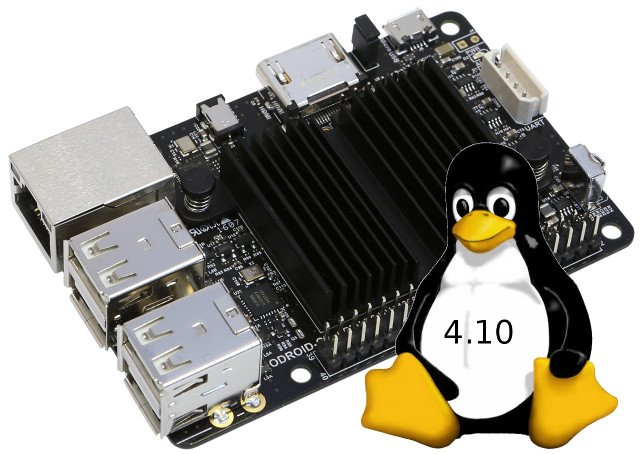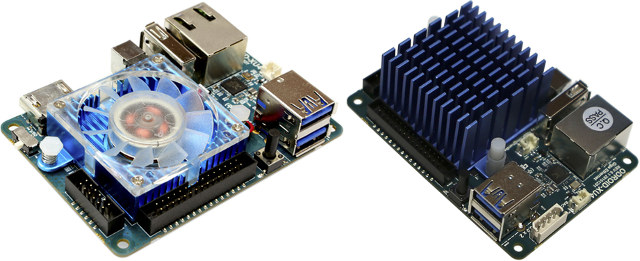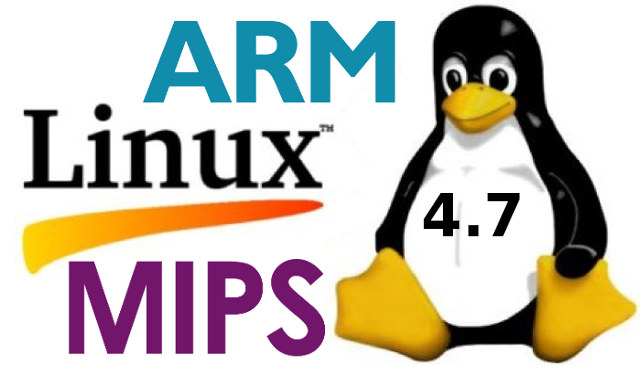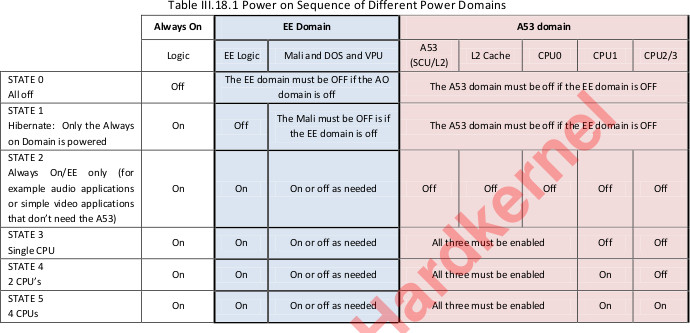Hardkernel has just launched their ODROID-HC1 stackable NAS system based on a cost-down version of ODROID-XU4 board powered by Samsung Exynos 5422 octa-core Cortex-A15/A7 processor, which as previously expect, you can purchase for $49 on Hardkernel website, or distributors like Ameridroid. We now have the complete specifications for ODROID-HC1 (Home Cloud One) platform: SoC – Samsung Exynos 5422 octa-core processor with 4x ARM Cortex-A15 @ 2.0 GHz, 4x ARM Cortex-A7 @ 1.4GHz, and Mali-T628 MP6 GPU supporting OpenGL ES 3.0 / 2.0 / 1.1 and OpenCL 1.1 Full profile System Memory – 2GB LPDDR3 RAM PoP @ 750 MHz Storage UHS-1 micro SD slot up to 128GB SATA interface via JMicron JMS578 USB 3.0 to SATA bridge chipset capable of achieving ~300 MB/s transfer rates The case supports 2.5″ drives between 7mm and 15mm thick Network Connectivity – 10/100/1000Mbps Ethernet (via USB 3.0) USB – 1x USB 2.0 port Debugging […]
Hardkernel to Launch Stackable $49 ODROID-HC1 Home Cloud & $200 ODROID-MC1 Cluster Solutions
Hardkernel ODROID-XU4 board is a powerful – yet inexpensive – ARM board based on Exynos 5422 octa-core processor that comes with 2GB RAM, Gigabit Ethernet, and a USB 3.0 interface which makes it suitable for networked storage applications. But the company found out that many of their users had troubles because of bad USB cables, and/or poorly designed & badly supported USB to SATA bridge chipsets. So they started to work on a new board called ODROID-HC1 (HC = Home Cloud) based on ODROID-XU4 design to provide a solution that’s both easier to ease and cheaper, and also includes a metal case and space for 2.5″ drives. They basically remove all unneeded features from ODROID-XU4 such as HDMI, eMMC connector, USB 3.0 hub, power button, slide switch, etc… The specifications for ODROID-HC1 kit with ODROID-XU4S board should look like: SoC – Samsung Exynos 5422 quad core ARM Cortex-A15 @ 2.0GHz […]
Diskio Pi 13.3″ Touch Panel Display Kit is Designed for Raspberry Pi and ODROID Boards (Crowdfunding)
If your project requires a touch panel, there are plenty of solutions for Raspberry Pi and ODROID boards, with Hardkernel even selling ODROID-VU8C fully integrated touch panel display. However, most display kits require you to make your own case, and feature smaller displays with lower resolution. One developer has however come up with Diskio Pi, a higher-end touch panel kit with a 13.3″ Full HD display that works with the most popular Raspberry Pi and ODROID boards. Diskio Pi specifications: Display – 13.3″ AUO TFT IPS display with 1920×1080 resolution connected via a 30-pin eDP connector ; 330 cd/m2 brightness; 85° viewing angles in all directions. Touch panel – 10-point capacitive touch; G/G structure; USB 2.0 interface; ≥6H surface hardness. Main board: HDMI to eDP driver Stereo sound amplifier USB 2.0 hub with 3x ports: 2x external + 1x internal Battery balance circuit (3S/3S2P) Expansion – Various headers for prototyping […]
ODROID-C2 Board Gets Experimental Ubuntu 16.04 Armbian Images with Linux 4.10
Hardkernel is doing a good job at providing working images with GPU / VPU support, and documentation for their ODROID boards. But while Exynos based ODROID-XU4(Q) boards already get firmware images with a recent Linux 4.9 kernel, Amlogic S905 based ODROID-C2 board’s Ubuntu 16.04 images still rely on the Linux 3.14 kernel released by Amlogic, plus various patchsets. But we’ve seen BayLibre is working on a Linux mainline port for Amlogic processors, and Armbian community appears to have leveraged that work, and added Ubuntu 16.04 Server and Desktop images with Linux 4.10 to their build system. Those are experimental nightly builds so they may not have been tested, and it’s likely not working as well as the Ubuntu 16.04 “legacy” images released by Hardkernel. They are also not shown in Armbian ODROID-C2 page at the time of writing, but it’s a step in the right direction. Jean-Luc Aufranc (CNXSoft)Jean-Luc started […]
Hardkernel ODROID-XU4Q is a Fanless Version of ODROID-XU4 Exynos 5422 Development Board
[Update May 2018: You may be interested in ODROID-XU4Q review with Ubuntu 18.04] We had already seen ODROID-XU4 development board price drop to $59 earlier this year, but a frequent complain about the board remained: it requires a fan to operate at full speed, and makes noise while the fan turns. To address this issue, the company has now launched ODROID-XU4Q board with exactly the same specifications with Samsung Exynos 5422 octa-core processor, 2GB RAM, eMMC module support, Gigabit Ethernet, USB 3.0, HDMI 1.4 etc…, except the fan is replaced by a large heatsink. The company has also thoroughly tested both versions in different configurations such as setting the maximum frequency to 1.8 or 2.0 GHz, and found ODROID-XU4Q to be slightly slower under high load due to CPU throttling, as the large heatsink does not cool quite as well as the smaller heatsink in combination with a fan. However […]
Hardkernel ODROID-VU8C is 8″ LCD Display and Case Kit for ODROID C1+ and C2 Boards
While it’s quite easy to find displays for development boards, they do not always come with a case, so you’d have to make your own. One easier option for the Raspberry Pi boards is the official Raspberry Pi 7″ LCD touch screen Display, plus RS Premium touchscreen case that selling for $132 in total including Raspberry Pi 3 board. But Hardkernel has now launched their own ODROID-VU8C 8″ Touch Display Shell Kit compatible with ODROID-C1+ and ODROID-C2 boards. Specifications and Kit Contents: 8-inch TFT-LCD with 1024×768 resolution (4:3 ratio) 10 finger capacitive touch input Back-light brightness control with ODROID GPIO PWM Viewing angle : Left 75, Right 75, Up 75, Down 75 degree Screen Dimensions : 189 x 149 x 29 mm Viewable screen size : 162 x121.5 mm (active area) Power Supply – 5V/4A DC to power barrel (powering both the LCD and ODROID ARM Linux board) Power consumption […]
Linux 4.7 Release – Main Changes, ARM and MIPS Architectures
Linux 4.7 is out: So, after a slight delay due to my travels, I’m back, and 4.7 is out. Despite it being two weeks since rc7, the final patch wasn’t all that big, and much of it is trivial one- and few-liners. There’s a couple of network drivers that got a bit more loving. Appended is the shortlog since rc7 for people who care: it’s fairly spread out, with networking and some intel Kabylake GPU fixes being the most noticeable ones. But there’s random small noise spread all over. And obviously, this means that the merge window for 4.8 is open.Judging by the linux-next contents, that’s going to be a bigger release than the current one (4.7 really was fairly calm, I blame at least partly summer in the northern hemisphere). Linus Linux 4.6 brought USB 3.1 superspeed, OrangeFS distributed file system, 802.1AE MAC-level encryption (MACsec), and BATMAN V protocol support, improved […]
Hardkernel Releases Amlogic S905 Datasheet
When you design a board and/or write drivers for an SoC it helps a lot to get info about electrical characteristics, memory map, registers’ addresses and values to understand how the hardware works, especially for custom applications, but many silicon vendors only distribute such documents under NDA to their business customers, with exception from companies such as Freescale (now NXP), and Texas Instruments. Hardkernel, the company developing ODROID boards, is also trying to release as much documentation as possible for their board such as Amlogic S805 datasheet for ODROID-C1/C1+ boards, and the Korean company has now released Amlogic S905 processor datasheet as the processor is used in their ODROID-C2 board. Some of the information available in the datasheet include Memory map Power domain CPU and GPU sub-system Clock & Reset Unit System Boot General Purpose Input/Output (GPIO) Interrupt Controller Direct Memory Access Controller (DMAC) Timers Crypto Etc… ODROID-C2 was launched […]


